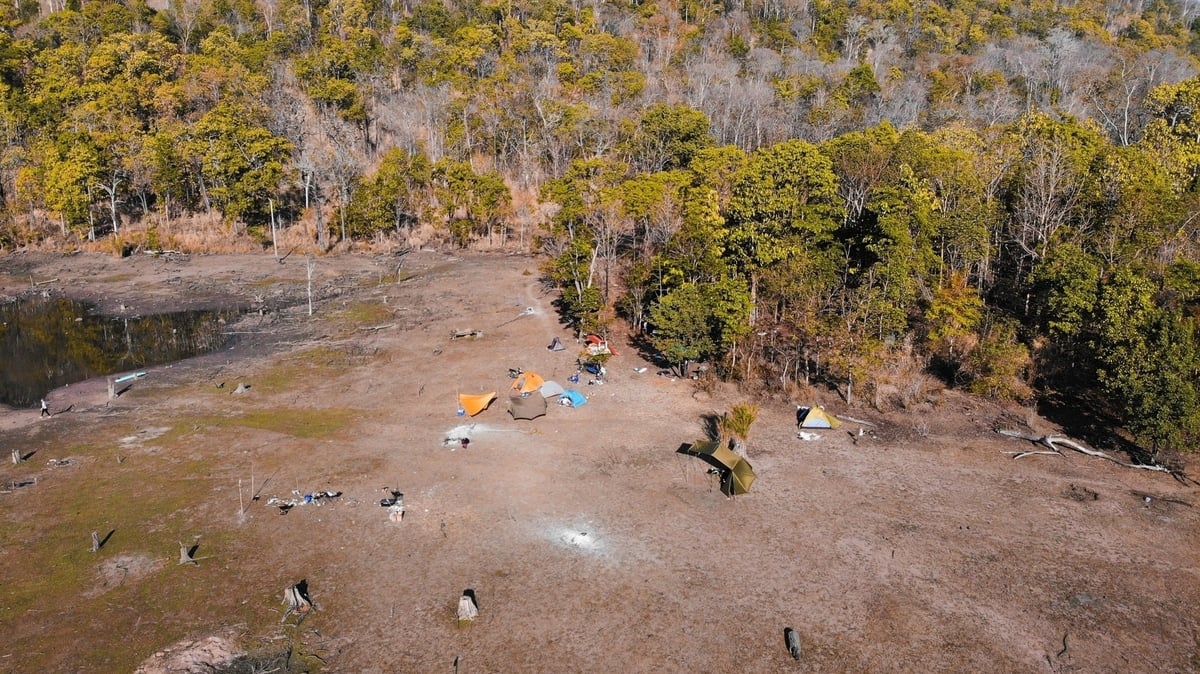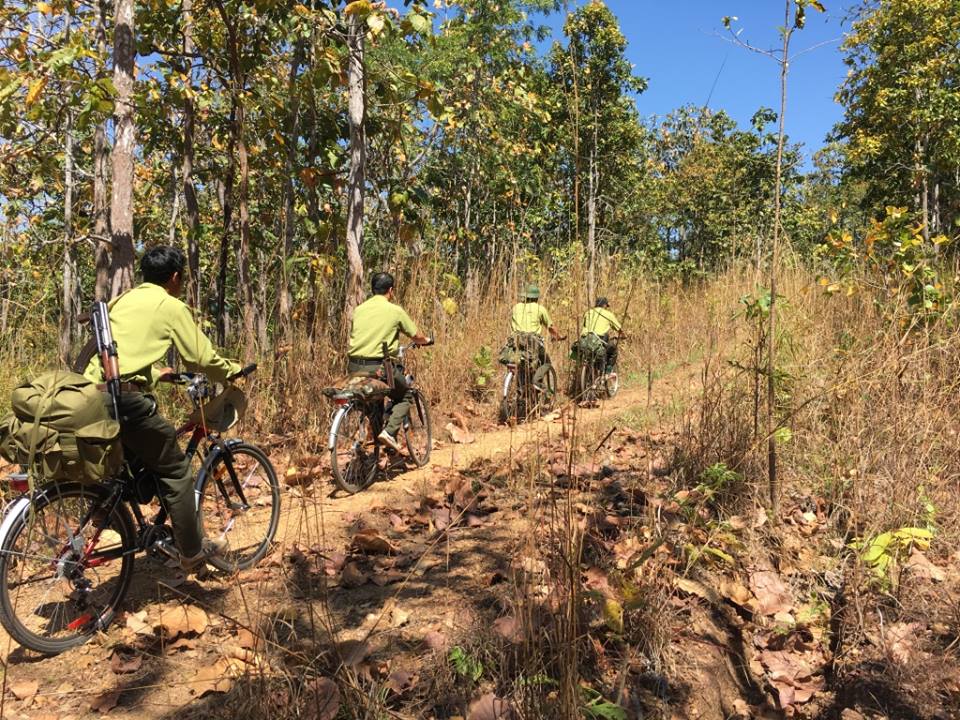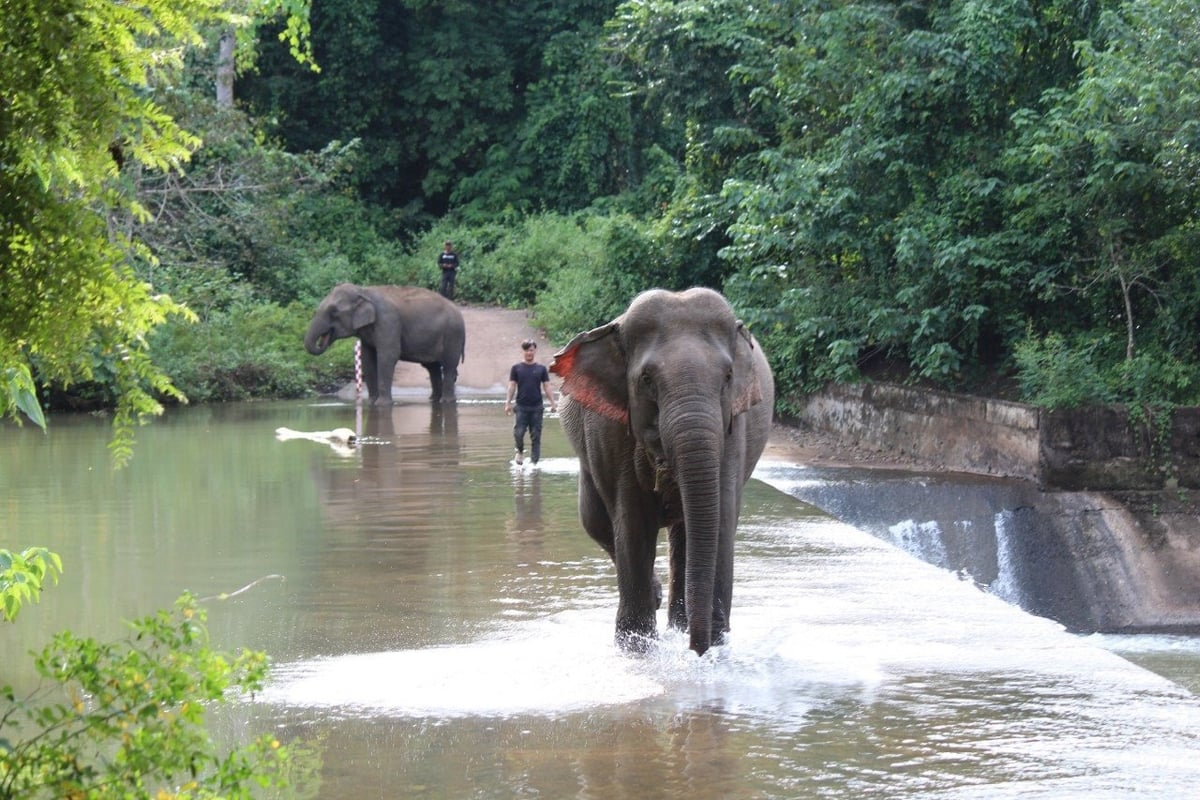December 1, 2025 | 09:29 GMT +7
December 1, 2025 | 09:29 GMT +7
Hotline: 0913.378.918
December 1, 2025 | 09:29 GMT +7
Hotline: 0913.378.918
According to Mr. Pham Tuan Linh, Director of Yok Don National Park, in order to protect forest areas and conserve the park’s globally significant biodiversity, Yok Don National Park has deployed dedicated forest protection forces stationed at ranger stations and checkpoints established by the park. These efforts are coordinated with local forest rangers to regularly patrol and inspect forest areas under the park’s management.

Yok Don National Park is managing nearly 111,000 hectares of natural forest.
"Currently, Yok Don National Park has established 16 forest protection stations and formed a mobile ranger team, which is also provided with station houses and checkpoints to carry out forest management and protection duties," Mr. Linh stated.
Thanks to the clear division of responsibilities, forest protection efforts have been effective. Rangers are well-informed about the condition of the forests they are assigned to, and the relationship between rangers and contracted forest protection communities has become close and cooperative. As a result, forest resource violations are detected early and handled promptly, preventing further forest loss.
The park’s specialized forest protection team is highly trained and passionate about their work. Yok Don also applies modern technologies in forest management, such as using SMART software, GPS devices for patrolling and monitoring, and tracking individual high-value trees within managed areas. Monitoring data is updated daily in MapInfo software and reported monthly during coordination meetings.
Mr. Linh added that in 2019, Yok Don National Park contracted out 17,500 hectares of forest to 19 communities across four key buffer zone communes, involving a total of 2,406 households. Each household is responsible for nearly 7.3 hectares annually and receives support of 400,000 VND per hectare, amounting to approximately 2.9 million VND per household per year. Results show that community-based contracting has been more effective than household-based contracts.
“Annual inspections show that contracted households have consistently fulfilled their obligations, with no cases of forest loss or degradation. Community groups have effectively organized patrolling and forest protection activities. As a result, local awareness and commitment to forest protection have increased, while household incomes have improved, helping to stabilize local livelihoods,” said Mr. Pham Tuan Linh, Director of Yok Don National Park.
Yok Don National Park is currently implementing a range of efforts to conserve biodiversity within its zones, restore degraded ecosystems in the ecological restoration area, and manage administrative and service activities in designated zones.

Forest patrol by bicycle.
The park protects nature and biodiversity through forest resource conservation, forest protection contracts, natural regeneration, forest enrichment, the creation of green belts and firebreaks, field demarcation with boundary markers, installation of forest protection rules signage, fire watchtowers, patrol routes, and forest protection awareness campaigns.
In addition, Yok Don National Park focuses on scientific research, continuing fundamental surveys of the park's flora and fauna, and applying scientific studies to conservation and management efforts. It also conducts training to improve the capacity of its staff in forest conservation, development, and environmental education for civil servants, students, and visitors.
The park is also investing in infrastructure development for biodiversity conservation. Support is provided to buffer zones to improve forest protection infrastructure in combination with community livelihood development. Programs on agricultural and forestry extension, awareness raising, and job creation are also implemented, contributing to sustainable socio-economic development.

The park and Animals Asia Foundation worked together to shift tourist behavior away from elephant rides and protect the health, longevity, welfare of domesticated elephants.
“In terms of plant diversity, Yok Don National Park has recorded 1,006 species belonging to 464 genera across 132 families. Of the four plant divisions found here, the Magnoliophyta (flowering plants) is the most diverse with 979 species, accounting for 97.3% of the total. Ferns (Polypodiophyta) follow with 22 species (2.2%), and Lycopodiophyta (club mosses) are the least represented with only 2 species (0.02%),” said Mr. Pham Tuan Linh, Director of Yok Don National Park.
He also noted that since 2018, the park has implemented the project Transforming Tourism Models Using Captive Elephants in Yok Don National Park, Dak Lak Province, funded by Animals Asia Foundation. The project aims to shift tourist behavior away from elephant rides to protect the health, longevity, and welfare of domesticated elephants.
"Yok Don National Park is striving to conserve the remaining population of domestic elephants in Dak Lak Province, while also preserving the traditional cultural heritage and unique socio-economic identity of the local communities efforts that carry deep humanistic significance. At the same time, we are improving service quality and infrastructure to develop tourism within the park," said Mr. Pham Tuan Linh, Director of Yok Don National Park.
Translated by Kieu Chi

(VAN) The inevitable path forward is to reorganize production along the value chain, utilizing cooperatives as the core, enterprises as the driving force, and farmers as the central subjects.

(VAN) On November 28, Minister Tran Duc Thang, together with China's Minister of Agriculture and Rural Affairs Han Jun, chaired the 2nd meeting of the Viet Nam - China Agricultural Cooperation Committee.

(VAN) Forest carbon credits are only accepted when they ensure absolute environmental integrity, additionality, permanence, and transparency.

(VAN) Viet Nam partners with Beijing on controlling air pollution, cross-regional management, high-tech monitoring and relocating polluting facilities.

(VAN) With a USD 50 million investment, Australia is partnering with Viet Nam to operate its first public electric bus fleet and develop a nationwide EV charging network.

(VAN) On November 28, in Beijing, Minister Tran Duc Thang met Minister of Ecology and Environment of China Huang Runqiu, to share experience on environmental protection.
/2025/11/28/0950-2-120557_751.jpg)
(VAN) The recent flood spell in the South Central region clearly reflects the characteristics of natural disasters in 2025, which are compound, prolonged, and amplified.